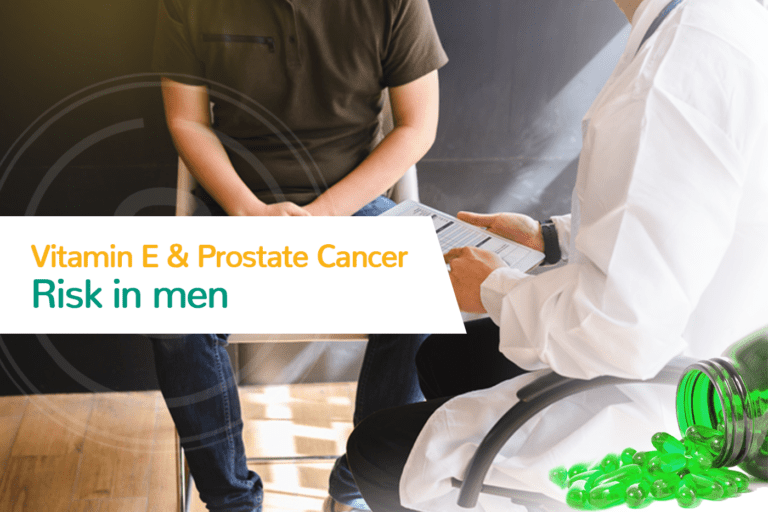Recent studies found that Vitamin E does not actually reduce the risk of prostate cancer but it actually increases the risk of cancer in you.
This alarming news spread rapidly, & many men are now in a dilemma that intake of vitamin E supplements are good or bad.
SMILES here gives you a brief about vitamin E and prostate cancer.
Introduction
Prostate cancer is the development of cancer in man’s prostate. This is the second most common type of cancer seen in men across the globe. Most cancers are slow-growing whereas some prostate cancers grow faster. These cancer cells may spread from the prostate to various other parts of the body mainly in the bones and lymph nodes.
The symptoms of prostate cancer include:
- ● Frequent urination
- ● Weak and interrupted urine flow
- ● An urge to urinate frequently
- ● Blood in the urine
- ● Seminal fluid
Other common symptoms include
- ● Erectile dysfunction
- ● Pain or burning during urination
- ● Discomfort when sitting which is caused by an enlarged prostate
It’s not clear what causes prostate cancer. The top urologists in Bangalore say that prostate cancer begins when some cells in a man’s prostate become abnormal. Mutations in these abnormal cells grow and divide more rapidly than normal cells do.
However, the American research team reveals that dietary supplementation with vitamin E plays a major role in increasing the risk of prostate cancer. SMILES gives you more information on how vitamin E promotes cancer?
Vitamin E and the Risk of Prostate Cancer
The early research of the Selenium and Vitamin E Cancer Prevention Trial (SELECT) found that there is no reduction in prostate cancer risk with either selenium or vitamin E supplements. Instead, there is a significant increase in prostate cancer risk with vitamin E among healthy men.
Two large randomized, placebo-controlled trials, the Physician’s Health Study (PHS) II and SELECT have been conducted in healthy men to investigate the effect of vitamin E supplements on prostate cancer.
PHS II followed 14,642 healthy men, aged 50 years and older, given 400 International Units (IU) of synthetic vitamin E every day for eight years. Through SELECT, 35,533 healthy men, aged 50 and older received 400 IU of synthetic vitamin E every day for seven years.
However, in both the trials, there was no benefit of taking vitamin E supplements on prostate cancer risk. After a period of 5.5 years (a median time) in SELECT, vitamin E supplementation was discontinued, yet follow-up of the study participants continued for 1.5 years in order to document additional events.
Surprisingly, the SELECT found a 17% increased risk of prostate cancers in men who had taken vitamin E supplements compared to those who received a placebo.
But, why we consider Vitamin E in the first place?
Vitamin E is a potent fat-soluble antioxidant that has been hypothesized to decrease the risk of cancers. Antioxidants neutralize the effects of free radicals, highly reactive species that oxidize DNA, proteins, and lipids inside our cells and tissues potentially cause damage and contribute to various diseases.
In particular, oxidative DNA damage may cause mutations that increase the risk of certain cancers including prostate cancer. Free radical exposure is undoubtedly an unavoidable aspect of our lives, as these are produced by many biological processes, such as cellular respiration, inflammation, and particularly cigarette smoke.
However, antioxidants produced in the body and ingested in the diet are essential to reduce oxidative stress and prevent the harmful effects of free radicals.
What to do?
Vitamin E is an important micronutrient and daily intake of vitamin E is crucial for optimum health. It is said that the Recommended Dietary Allowance (RDA) of vitamin E for adult men and women is 22.5 IU per day.
Notably, more than 90% of individuals aged 2 years and older do not meet the daily requirement of vitamin E from food sources alone. Therefore, RDA recommends the other major sources of vitamin E that include vegetable oils, nuts, whole grains, and green leafy vegetables.
If you are suffering from prostate cancer then prevent your risk of prostate cancer from the top experts of prostate cancer treatment at SMILES.

